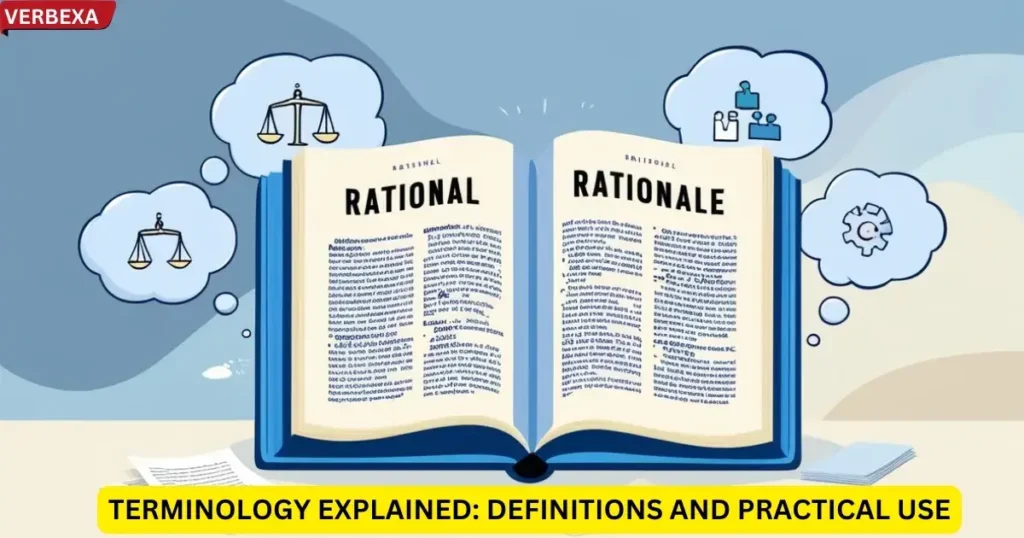Many people stumble over the rational vs rationale distinction. It’s a common grammatical pitfall, but understanding the difference is crucial for clear and effective communication, whether you’re writing a research paper, crafting a business proposal, or simply engaging in everyday conversation. For instance, consider these scenarios: a team leader justifying a new project strategy needs to provide a clear rationale, while making rational decisions about resource allocation is crucial for project success.
This article aims to clarify the rational vs rationale debate once and for all. We’ll explore the nuances of each term, providing examples and practical advice to help you confidently choose the right word in any context. Let’s dive into this rationale vs rational discussion.
Key Takeaways
- Rational = Logical adjective
- Rationale = Reason or explanation noun
- Context is crucial in selection
- Practice makes perfect!
Terminology Explained: Definitions and Practical Use

Rational: The Adjective of Reason
Rational is an adjective that describes something characterized by logical reasoning and sound judgment. When we say something is rational, we mean it’s:
- Based on reason or logic
- Sensible and practical
- Free from emotional influence
Example Scenarios:
- “Her rational approach to problem-solving helped the team navigate the crisis.”
- “Making a rational decision requires separating emotions from facts.”
- “A rational investor considers long-term benefits over short-term gains.”
Rationale: The Noun of Justification
Rationale is a noun representing the underlying reason or justification for an action, belief, or process. It explains the reasoning behind a particular choice or strategy.
Example Scenarios:
- “The company’s rationale for implementing the new policy was to improve workplace efficiency.”
- “She explained the rationale behind her research methodology in the project proposal.”
- “Understanding the rationale helps team members align with strategic objectives.”
Understanding this rational vs rationale difference is crucial for accurate and effective communication. The rational vs rationale pronunciation might sound similar, but the meanings are distinct. A rational vs rationale quiz might help solidify your understanding.
Synonyms: Rational and Rationale

Rational Synonyms:
- Logical
- Reasonable
- Sound
- Sensible
- Coherent
- Lucid
- Pragmatic
- Analytical
- Clear-headed
- Objective
Rationale Synonyms:
- Justification
- Reasoning
- Explanation
- Motivation
- Grounds
- Basis
- Principle
- Argument
- Defense
- Validation
Comparison Table: Rational vs Rationale at a Glance
| Aspect | Rational | Rationale |
|---|---|---|
| Part of Speech | Adjective | Noun |
| Definition | Logical, reasonable | Underlying reason or explanation |
| Usage Context | Describing thinking or behavior | Explaining the purpose or reason |
| Example Phrase | Rational decision-making | The rationale behind the decision |
The Right Word, at the Right Time: A Practical Guide

Choosing Rational
Use rational when you want to describe:
- Logical thinking
- Reasonable behavior
- Decision-making processes
- Objective perspectives
Choosing Rationale
Use rationale when you need to:
- Explain the reasoning
- Provide justification
- Describe the underlying motivation
- Clarify the purpose of an action or strategy
Everyday Usage Examples: Real-World Application
- Rational Example:
“John’s rational approach to managing unexpected expenses prevented financial stress.” - Rationale Example:
“The team requested a detailed rationale for the project delays to understand the challenges.”
Common Mistakes to Avoid
- Don’t use rational as a noun
- Don’t use rationale as an adjective
- Always consider the grammatical context
Pronunciation Guide
- Rational: /ˈræʃənəl/
- Rationale: /ˌræʃəˈnæl/
Conclusion: Mastering Rational vs Rationale
The difference between rational and rationale boils down to their grammatical roles and their respective functions within a sentence. By recognizing rational as an adjective describing logical thinking and rationale as a noun explaining reasoning, you’ll elevate your professional and personal communication.
Practice distinguishing between rationale or rational, and soon, selecting the right word will become second nature. Remember, clear communication, whether you’re explaining a complex business strategy or simply justifying a personal decision, is the cornerstone of effective interaction.

This author is a passionate linguist and grammar enthusiast, dedicated to helping individuals master the art of language. With years of experience in teaching and editing, she brings clarity and precision to every sentence. Tina’s mission is to empower writers of all levels to express themselves with confidence and excellence.

